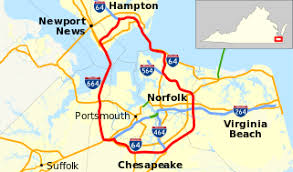By Chris Wiegard, Citizens’ Climate Lobby
In Florida, there is a rapidly evolving understanding of the scale of the sea-level rise predicament. This situation may feel unique, but it’s shared by many American communities including the Hampton Roads metropolitan area, in coastal Virginia.
The political predicament of this community holds many lessons on the need for solidarity and realism in our efforts to fight sea-level rise.
Hampton Roads is a large community composed of a number of political jurisdictions. A gradual realization has arrived in the community that sea-level rise poses an existential threat to some parts of the community, especially the low-lying city of Norfolk.

Political discourse here focuses on flooding “resilience,” which generally means using federal dollars to lift roads, and build sea walls, improve sewer systems, and strengthen infrastructure to keep people in their homes.
Homeowners, business leaders, and politicians can all get behind this, as it threatens no value systems. The climate change that contributes to the flooding is not mentioned. Virginia faces $31 billion in sea-level rise costs by 2040, while Florida tops the list of states with $75 billion in projected costs, according to the Center for Climate Integrity.
Unfortunately, federal dollars are in short supply, with annual deficits of $1 trillion and a massive wave of new borrowing to address the COVID-19 economic crash. Federal lawmakers from the interior of the country are not very interested under these conditions in providing money to coastal communities threatened by the sea on the Atlantic, Pacific, and Gulf coasts.
There is also a false narrative at work: that climate change is all about “safe” communities paying up to rescue “unsafe” communities. But there are no safe communities.
Inland regions will experience extreme weather — heat waves, seasonal floods, and crop failures, and have started to see these disasters already. An effective response to climate change will depend on political solidarity rather than Americans separating into camps feuding over money.
Compare the challenge of coastal communities to the predicament of my generation, the boomers, in the COVID-19 pandemic. In both cases, solidarity is elusive.

Young people are tempted to frequent bars and restaurants even though their actions endanger their parents and grandparents. On climate, older Americans and heartland residents ignore the threat because they feel they will die before the disaster hits, or because they believe that coastal residents are the only people threatened.
True solutions to sea-level rise depend on both realism and compassion for other generations and constituencies. Resilience will take place as the political process offers the only way for desperate citizens to access resources.
But mitigation is more important in the long term, and depends entirely on solidarity. To cut the carbon emissions that are causing Greenland and Antarctica glaciers to melt, we must become a single team. We must incorporate mitigation solutions into our economic system.
The best way to do that is to set up carbon fees and dividends so that all of us will have a financial reason to enter a better world together. There is a bill before Congress, the Energy Innovation and Carbon Dividend Act, that would do this.
It was drafted by Florida Congressmen Ted Deutch (a Democrat) and Francis Rooney (a Republican) and now has 78 cosponsors. Coastal residents should be asking their heartland colleagues to support this bill.
Climate change and COVID-19 are both science-based threats to human survival for which an ounce of prevention outweighs a ton of regret. But they are also both massive tests of the human capacity to act in concert to defend our species by harnessing the emotion we call “love.”
Chris Wiegard volunteers as the Virginia State Co-Coordinator for Citizens’ Climate Lobby.
“The Invading Sea” is the opinion arm of the Florida Climate Reporting Network, a collaborative of news organizations across the state focusing on the threats posed by the warming climate.



